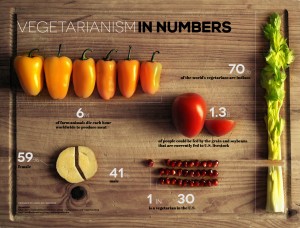That is a cute little animal on your plate…
Vegetarianism is a big switch. It requires changing your behavior multiple times in a day and breaking the routine that used to be a meal. So who would want to put themselves through that? The answer is mostly women. “Both vegetarianism and support for vegetarian practices has been found to be more prevalent  among women than men in a South Australian teenage sample (Worsley and Skrzypiec 1998). That study concluded that both self-reported vegetarianism and social support for vegetarianism was largely a female phenomenon and that vegetarian beliefs predicted vegetarian eating habits. The research also found that teenage vegetarians and non-vegetarians adhere to different ideologies in areas such as environmentalism, feminism, and animal rights and posited that the ideological differences might be the result of different personal values, or guiding principles…” The 1999 article, Social Psychological and Structural Influences on Vegetarian Beliefs, Kalof discussed who is most likely to become a vegetarian and the motives behind becoming a vegetarian. There are two main motives for becoming a vegetarian: health concerns and animal rights.
among women than men in a South Australian teenage sample (Worsley and Skrzypiec 1998). That study concluded that both self-reported vegetarianism and social support for vegetarianism was largely a female phenomenon and that vegetarian beliefs predicted vegetarian eating habits. The research also found that teenage vegetarians and non-vegetarians adhere to different ideologies in areas such as environmentalism, feminism, and animal rights and posited that the ideological differences might be the result of different personal values, or guiding principles…” The 1999 article, Social Psychological and Structural Influences on Vegetarian Beliefs, Kalof discussed who is most likely to become a vegetarian and the motives behind becoming a vegetarian. There are two main motives for becoming a vegetarian: health concerns and animal rights.
One of the large problems facing American today is cholesterol and cardiovascular problems. Cholesterol is a lipid (fat) which is naturally produced by the liver. However, it also exists in all animal bi-products, like meat, butter, and cream. With the increased availability of meat in the market, the prices have decreased. With lower prices, meat is more readily consumed. This means the average American is eating a larger amount of cholesterol, to a point where the body doesn’t know how to handle it. This leads to clogged arteries and heart attacks. In order to limit their intake of cholesterol, some people are choosing to forgo eating meat. “Concern about the damaging effects of consuming animal fat and cholesterol is the most often cited rationale for adopting a vegetarian diet…”
The more popular reason for becoming a vegetarian is to limit the environmental and ethical problems. “Ethical concerns about the welfare of animals and the environment a re also often cited as reasons for adopting a meatless diet … and ethnographic work suggests that such ethical beliefs are common among vegetarians.” The current methods of raising meat for consumption are anything but cruelty-free. CAFOs (Concentrated Animal Feeding Operations) are in the business of producing meat for profit, which means the animals are being treated inhumanely. As a stand against the horrible conditions, some choose to stop eating meat as a protest to the conditions. Women are more likely to feel this way.
re also often cited as reasons for adopting a meatless diet … and ethnographic work suggests that such ethical beliefs are common among vegetarians.” The current methods of raising meat for consumption are anything but cruelty-free. CAFOs (Concentrated Animal Feeding Operations) are in the business of producing meat for profit, which means the animals are being treated inhumanely. As a stand against the horrible conditions, some choose to stop eating meat as a protest to the conditions. Women are more likely to feel this way.
All of these factors combine to a large social motivator to become vegetarian. The more social pressure there is do do something, the more likely that event will happen. After the Golden Era of Environmentalism, the idea of helping the world has been on everyone’s mind. Once the seed is planted, its up to the nourishment it receives from someone’s beliefs to make the vegetarianism bloom.
If you want to read the study:
Kalof, L., Dietz, T., Stern, P. C. and Guagnano, G. A. (1999), Social Psychological and Structural Influences on Vegetarian Beliefs. Rural Sociology, 64: 500–511. doi: 10.1111/j.1549-0831.1999.tb00364.x
Leave a Reply